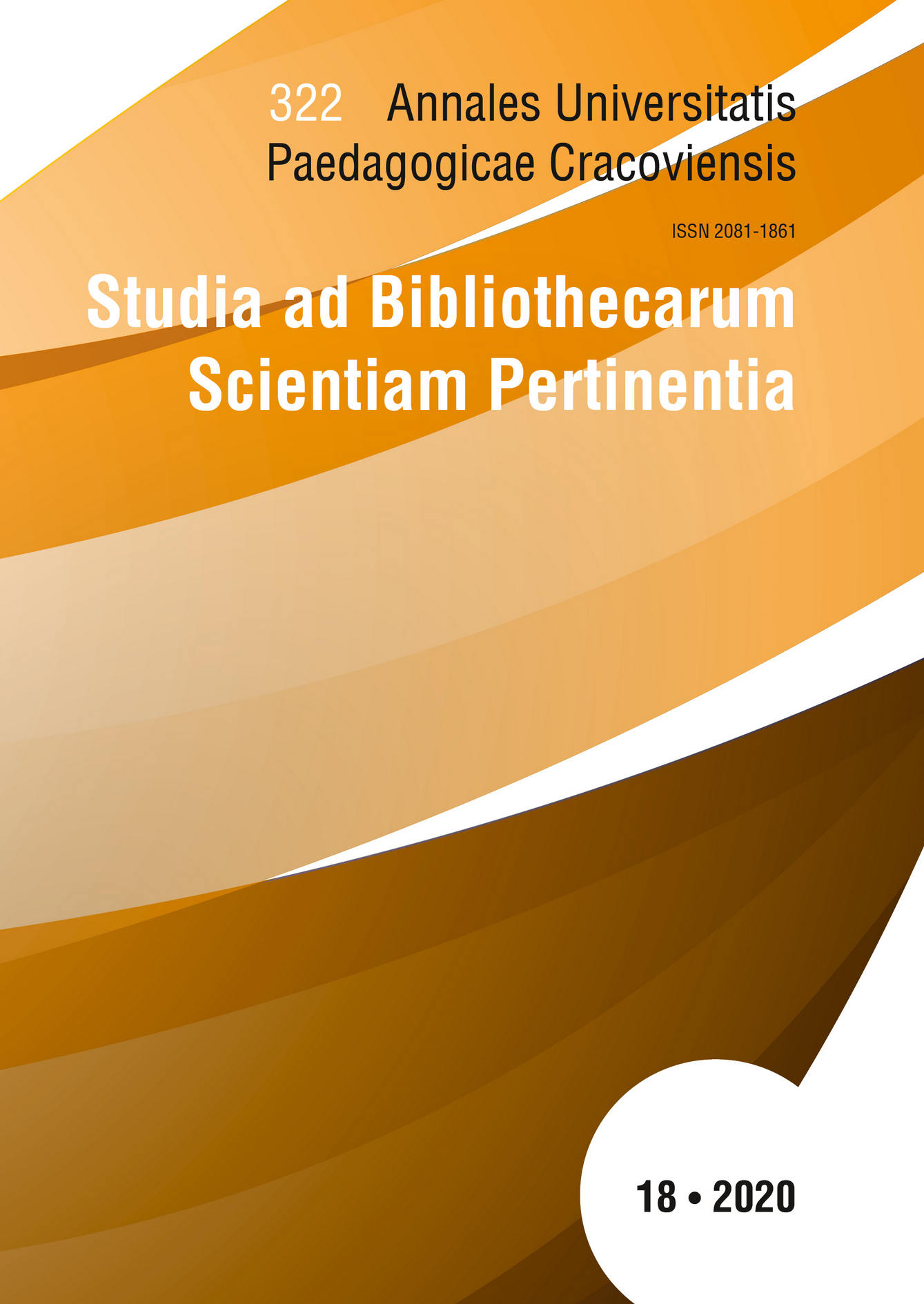Samoocena zdrowotnych kompetencji informacyjnych studentów – wyniki badania pilotażowego studentów kierunku bezpieczeństwo zdrowotne na Uniwersytecie Pedagogicznym w Krakowie
DOI:
https://doi.org/10.24917/20811861.18.22Słowa kluczowe:
health information; health competence; health information competence; self-evaluation of competence; studentsAbstrakt
Health information is one of the groups of information that are most widely searched online. The ability to effectively search through the web, process the data and use it properly are all essential components of health information competences. Furthermore, contact with low-quality health information may bear negative effects for the users of such advice. On the basis of source literature analysis, the article presents a definition of the term “health information competence”, gives examples of skills within this competence, discusses negative consequences of low-level health competence and cites example research projects in the field of assessing health information competence. The publication also presents the results of a pilot study (diagnosis) entailing the self-evaluation of health information competencies of health security students at the Pedagogical University of Cracow. It has been pointed out that students declare having a high level of health information competence, especially in finding and understanding health information.
Bibliografia
Agency for Healthcare Research and Quality, Health Literacy Measurement Tools (Revised), [on-line:] http://www.ahrq.gov/professionals/quality-patient-safety/quality-resources/tools/literacy/ – 23.07.2015.
Chumber S., Huber J., Ghezzi P., A methodology to analyze the quality of health information on the internet: the example of diabetic neuropathy, „The Diabetes Educator” 2015, Vol. 41, Iss. 1, s. 95-105.
Czerwińska M., Kierunki wykorzystania Internetu w celach zdrowotnych na podstawie badań empirycznych, „Studies & Proceedings of Polish Association for Knowledge Management” 2014, nr 71, s. 18-28.
Eurostat, Individuals using the internet for seeking health-related information – % of individuals aged 16 to 74, [on-line:] http://epp.eurostat.ec.europa.eu/tgm/table.do? tab=table&init=1&language=en&pcode=tin00101&plugin – 31.05.2020.
Główny Urząd Statystyczny, Społeczeństwo informacyjne w Polsce w 2015 r. Opracowanie sygnalne, [on-line:] http://stat.gov.pl/obszary-tematyczne/nauka-i-technika-spoleczenstwo-informacyjne/spoleczenstwo-informacyjne/spoleczenstwo-informacyjne-w-polsce-w-2015-r-,2,5.html – 08.01.2017.
Hanik B., Stellefson M., E-Health Literacy Competencies among Undergraduate Health Education Students: A Preliminary Study, „International Electronic Journal of Health Education” 2011, Vol. 14, s. 46-58.
Hasan M., Abolfazl T., Relation between information literacy and health literacy of students in Ferdowsi University of Mashhad, „Human Information Interaction” 2015, Vol. 2, No. 2, s. 31-41.
HLS-EU Consortium, Comparative Report of Health Literacy in Eight EU Member States. The European Health Literacy Survey HLS-EU (Second revised and extended version, date July 22th, 2014), [on-line:] https://cdn1.sph.harvard.edu/wp-content/uploads/sites/135/2015/09/neu_rev_hls-eu_report_2015_05_13_lit.pdf – 31.05.2020.
Ivanitskaya L. et. al., Developing health information literacy: a needs analysis from the perspective of preprofessional health students, „Journal of the Medical Library Association” 2012, Vol. 100 (4), s. 277-283.
Ivanitskaya L., O’Boyle I., Casey A.M., Health Information Literacy and Competencies of Information AgeStudents: Results From the Interactive Online Research ReadinessSelf-Assessment (RRSA), „Journal of Medical Internet Research” 2006, Vol. 8, No. 2, e6.
Kardialik K., Olejniczak D., Religioni U., Wykorzystanie umiejętności odczytywania (postrzegania) zdrowia przez studentów w procesie pozyskiwania informacji o chorobach, „Hygeia Public Health” 2012, nr 47 (1), s. 89-94.
Kisilowska M., Jasiewicz J., współpr. Paul M., Informacja zdrowotna: oczekiwania i kompetencje polskich użytkowników. Raport z badań eksploracyjnych, Warszawa 2013.
Knol-Michałowska K., Internet jako źródło informacji o zdrowiu – wady i zalety dla relacji lekarz – pacjent. Perspektywa pacjentów, „Hygeia Public Health” 2014, nr 49 (3), s. 389-397.
Kosycarz E., Walendowicz K., Świadomość zdrowotna jako kluczowy determinant stanu zdrowia społeczeństwa, „Studia i Prace Kolegium Zarządzania i Finansów” 2018, nr 165, s. 79-94.
Krawczyńska A., Internet a kształtowanie zaufania w usługach medycznych, [w:] Innowacje w marketingu, red. M. Skurczyński, t. 3, Sopot 2005, s. 373-383.
Mahmood K., Do People Overestimate Their Information Literacy Skills? A Systematic Review of Empirical Evidence on the Dunning-Kruger Effect, „Communications in Information Literacy” 2016, Vol. 10, Iss. 2, s. 199-213.
Medical Library Association, What is health information literacy, [on-line:] https://www.mlanet.org/resources/healthlit/define.html – 22.07.2015.
Nengomasha C.T., Abankwah R.M., Health Information Literacy of the University of Namibia’s Students, „Journal for Studies in Humanities and Social Sciences” 2015, vol. 4, no. 1-2, s. 179-192.
Niedorys B. et al., Kompetencje zdrowotne (Health Literacy) – przegląd badań z wykorzystaniem Europejskiego Kwestionariusza Kompetencji Zdrowotnych (HLS-EU-Q47) w latach 2010-2018, „Hygeia Public Health” 2019, nr 54 (2), s. 105-113.
Niedźwiedzka B., Health information literacy as an increasingly important component of health literacy, „Zdrowie Publiczne” 2013, nr 123 (1), s. 98-103.
Niedźwiedzka B., Słońska Z., Taran Y., Samoocena zdrowotnych kompetencji informacyjnych Polaków w świetle koncepcji samoskuteczności. Analiza wybranych wyników polskiej części Europejskiego Sondażu Kompetencji Zdrowotnych [HLS-EU], „Zdrowie Publiczne i Zarządzanie” 2012, t. 10, nr 3, s. 212-220.
Health literacy: a prescription to end confusion, eds. L. Nielsen-Bohlman, A.M. Panzer, D.A. Kindig, Washington 2004.
Nowakowska I. et al., Opinie obecnych i przyszłych pacjentów o Internecie jako marketingowym źródle informacji o podmiocie leczniczym, „Pielęgniarstwo Polskie” 2017, nr 3 (65), s. 501-505.
Parker R.M. et al., The test of functional health literacy in adults: a new instrument for measuring patients’ literacy skills, „Journal of General Internal Medicine” 1995, Vol. 10, No. 10, s. 537-541.
Polskie Badania Internetu, Internetowe serwisy o zdrowiu: zawartość, popularność, profil użytkowników, poszukiwane informacje, [on-line:] http://pbi.org.pl/raporty/zdrowieserwisy.pdf – 23.07.2015.
Sørensen K. et al., Health literacy and public health: A systematic review and integration of definitions and models, „BMC Public Health” 2012, Vol. 12. [on line:] https://bmcpublichealth.biomedcentral.com/articles/10.1186/1471-2458-12-80#citeas – 11.10.2020.
Tubaishat A., Habiballah L., eHealth literacy among undergraduate nursing students, „Nurse Education Today” 2016, Vol. 42, s. 47-52.
Weiss B., Health literacy and patient safety: help patients understand. Manual for clinicians, [Chicago] 2007.
Ziuziański P., Furmankiewicz M., Rola Internetu w autodiagnozie i samoleczeniu: szanse i zagrożenia, [w:] Rola informatyki w naukach ekonomicznych i społecznych, red. Z. Zieliński, Kielce 2014, s. 61-72.
Pobrania
Opublikowane
Jak cytować
Numer
Dział
Licencja
Prawa autorskie (c) 2020 Annales Universitatis Paedagogicae Cracoviensis | Studia ad Bibliothecarum Scientiam Pertinentia

Utwór dostępny jest na licencji Creative Commons Uznanie autorstwa – Użycie niekomercyjne – Bez utworów zależnych 4.0 Międzynarodowe.

